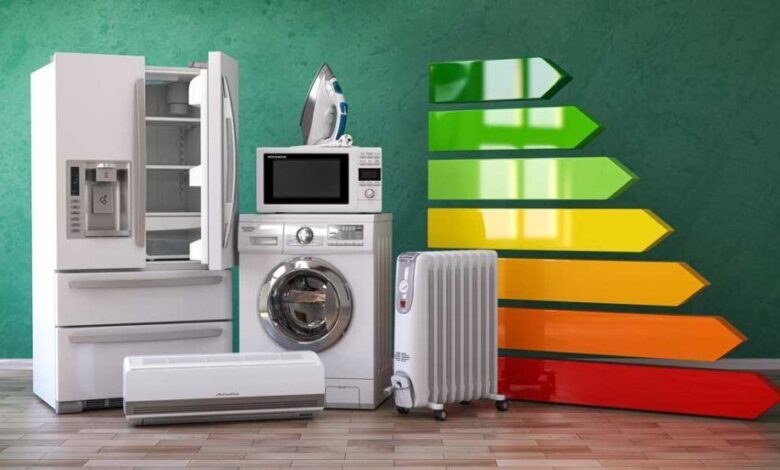
Green Living is about more than avoiding plastic straws or walking to your nearest grocery store. It’s also about using appliances that conserve electricity while offering improved performance and functionality.
While energy-efficient home appliances might have a bigger price tag than their traditional counterparts, the savings on your electricity bills can help you recoup the investment quickly.
Refrigerators
Refrigerators are among the most energy-hungry home appliances, so upgrading to a high-efficiency model can significantly lower household electricity costs. When purchasing a new refrigerator, ensure it consumes less energy by looking for the ENERGY STAR label.
Additionally, consider purchasing a refrigerator with smart technology features that use Wi-Fi or Bluetooth to monitor and control appliance usage. This can help you avoid unnecessary energy usage and optimize your energy consumption.
Applying a promo code when purchasing a refrigerator is a savvy decision that not only slashes the overall cost of this essential home appliance but also often unlocks additional perks such as free delivery or extended warranties, elevating the value of the investment. For instance, a Samsung promo code transforms the refrigerator buying experience into a budget-friendly and feature-rich endeavor, ensuring savings and enhanced satisfaction.
In addition to cost savings, embracing energy efficiency will minimize your environmental impact. Green fridges, washers, dryers, and dishwashers generate significantly fewer greenhouse gas emissions than traditional appliances. This can reduce your carbon footprint and promote a greener world. Finally, green upgrades can also boost your home’s resale value.
Washing Machines
Look for the Energy Star seal on any appliance if you want to buy energy-efficient ones for your house. The Energy Star program is government-backed and industry-trusted. It certifies appliances that meet specific energy efficiency standards and provides tax incentives to lower upfront costs and provide long-term savings.
Purchasing energy-efficient appliances can save you money on electricity bills and reduce your carbon footprint. Compared to non-energy-efficient appliances, green models typically use less electricity and water. They also have a longer lifespan and require less maintenance.
Up to a quarter of your energy bills can be saved by investing in energy-efficient appliances, even though they may be more expensive initially. To get the best results from your appliances, look for front-loading washers that use less water and electricity than top-loaders. Also, avoid using too much detergent, and rinse with vinegar to remove hard water deposits.
Dryers
The clothes dryer is another household appliance that uses a lot of electricity, especially older models. But, like the washing machine, you can reduce energy use by opting for an Energy Star-certified clothes dryer. These appliances consume 20% less electricity than traditional units, and you can save up to $25 per year on your utility bills.
An excellent way to save money and lessen your environmental impact is to invest in energy-efficient appliances as energy prices continue to rise. From refrigerators to washing machines and dishwashers, you can make a difference by choosing ENERGY STAR-certified appliances. The ENERGY STAR program has already reduced energy costs and greenhouse gasses by $500 billion and 4 billion metric tons, respectively. Another way you can maximize your green efforts is by signing up for a fair, fixed-rate electricity plan, which provides 100% renewable energy sourced from solar, wind, and carbon-neutral natural gas.
Dishwashers
Dishwashers are a staple in most kitchens. But if you have an old one, replacing it with an Energy Star-certified model is worth replacing. According to research, older dishwashers waste 10 gallons of water with each load, which adds up over a year. You can save hundreds of dollars a year on your electricity bills with the right energy-efficient models.
Aside from being environmentally friendly, the best dishwasher brands have low repair and high-reliability rates. In addition, you may qualify for state, local, or utility rebates to offset the upfront cost of an energy-efficient appliance.
The financial relief these rebates offer significantly shortens the payback period for energy-efficient appliances, making them more enticing to consumers. Additionally, they reduce greenhouse gas emissions and the depletion of natural resources, contributing to a greener global environment. Energy-efficient upgrades also increase the resale value of your home, which can help you recoup your initial investment.
Stoves
If you want to cut your energy usage and save money, it may be time to swap out your old appliances for newer models. The more efficient ones use fewer kilowatt hours for the same job, meaning less electricity and a lighter carbon footprint.
Stoves provide heat by burning fuel and generating smoke particles that radiate the warmth. Enclosing the fire in a chamber and connecting it to a chimney raises the temperature to a point where complete combustion reactions can occur. This also regulates air ingress, and heat loss by convection is eliminated.
Modern stoves that combine an oven and cooktop in one device are called ranges, though many people still call them stoves. Either way, if you’re replacing your kitchen appliances, opt for the most efficient model on the market.
Air Conditioners
Having energy-efficient appliances in your home isn’t just good for the environment. It’s also a great way to save money on utility bills. The best part is you can get these eco-friendly appliances at a much more affordable price thanks to the various rebates and tax incentives.
Energy-efficient appliances work more efficiently than their conventional counterparts, so they can do the same amount of work with less energy. This means they can lower your electricity bills by a significant margin, which can translate to hundreds of dollars saved in the long run. And since they last longer than their traditional counterparts, they’re a solid investment for your home. Moreover, their minimal environmental impact can help reduce greenhouse gas emissions and depletion of natural resources, contributing to a greener planet.

